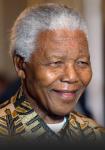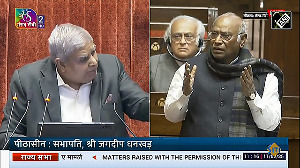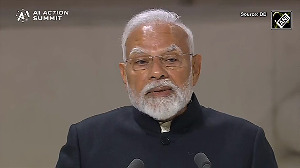All the kind of epithets, the likes of which till now used to come easily out of President George Bush's mouth and the pens of his neo conservative supporters.
Mr Bush should be worried that he has now a growing number of competitors in the coining of demonising epithets in the community of the self-styled secularists of India.
What epithets they did not use against Narendra Modi for the last five years and particularly in the weeks before the election to the Gujarat legislative assembly, in which the Modi-led Bharatiya Janata Party won a spectacular victory despite the best (or worst) efforts of these self-styled secularists to demonise him day in and day out!
The pathological dislike -- even hatred -- that some of our journalists -- particularly in the electronic media -- have for Modi could be seen or sensed as one watched the television coverage of the counting of votes on December 23.
Initially, as it appeared that the BJP might not do well in the final tally, there was excitement among many television anchors. They thought they had tasted blood. After an hour, the BJP candidates started racing ahead and it became clear the the Congress was in for a drubbing.
The disappointment on the faces of some of the anchors was to be seen to be believed. A star lady anchor could not help remarking: 'Modi might be able to win the elections in Gujarat, but he still can't get a visa to go to the US and other Western countries.' Some consolation!
Instead of spending their time searching for abusive expressions in the dictionary and in their copy-book of such expressions, if these self-styled secularists had only visited the Web sites, discussion groups and blogspots of members of the Hindu community not only in India, but also in other countries of the world -- particularly in the US -- they would have noticed something, which might have given them cause for introspection.
They would have noticed that Modi is becoming the icon of a growing number of Hindus not only in India, but also in the Hindu Diaspora spread across the world. The support for him is not confined only to the Gujarati-speaking Hindus of the world. It is spread right across the Hindu spectrum -- whatever be the language or ethnicity or place of origin of the Hindus concerned.
They would have noticed that in the Hindu Diaspora in the West, more young people admire Modi than grown-ups. Many of his young admirers in the US were born and brought up there and had the benefit of the best of secular education. In spite of this, there is a sense of pride in them that the Hindu community has at long last produced a leader of the calibre of Modi.
What is it they see in him?
His simple and austere living of the kind associated with the late Kamaraj of Tamil Nadu, but not seen in the leaders of today?
His reputation as an incorruptible politician, the likes of which is not found anywhere in India, not even in his own party?
His style of development-oriented governance, which even his detractors do not hesitate to praise?
The fruits of his policy, which Gujarat and its people are already enjoying?
His tough stance on terrorism?
His lucid-thinking on matters concerning our national security?
His defiance in the face of the greatest campaign of demonisation mounted against him, the likes of which only Indira Gandhi had faced from her political opponents and sections of the media in the 1970s?
All these are factors, which influence their favourable perception of him, and which have already been highlighted and analysed in the articles on his impressive election victory.
But there is one factor, which is more important than these and which has not found mention in the analyses.
That is, for large sections of the Hindus -- young and old, even more among the young than among the old -- he gave them a sense of pride in their identity as Hindus.
They feel that he removed from their minds long habits of defensiveness as Hindus carefully nurtured by the self-styled secularists.
As if to proclaim one's Hindu identity and to assert one's rights as Hindus in their own homeland in which they are in a vast majority (80 per cent of the population) is to be communal, is to become an ugly Indian.
For these self-styled secularists, a pretty Indian is a Hindu, who is all the time on the defensive, fights shy of proclaiming his Hindu personality and asserting his rights as a member of the majority community.
These self-styled secularists would not address their sermons of secularism to the Islamic countries, where for a Muslim to convert a non-Muslim into Islam is an act blessed by Allah, but for a non-Muslim to convert a Muslim into his religion is a crime calling for the death penalty.
For them, secularism is a virtue which a Hindu should practise towards others, but not others towards him.
It is Modi's rejection of this hypocrisy of the self-styled secularists, which makes him stand apart as a Hindu leader with a difference in the eyes of his admirers.
Bharathiyar, the Tamil poet who inspired millions of Tamil youth to join the independence struggle under Mahatma Gandhi, wrote: Tamizhanenru Chollada, Talai Nimirndhu Nillada (Say You Are a Tamil, Hold Your Head High).
The growing legion of Modi's admirers in the Hindu community all over the world are saying: Hindu Enru Chollada, Talai Nimirndu Nillada (Say You Are A Hindu, Hold Your Head High).
They are no longer prepared to be defensive in proclaiming their Hindu idenity, in asserting their rights as Hindus.
They are secular in the genuine sense of the word, but for them secularism does not mean developing a guilt complex about being a Hindu and all the time conceding the rights of others. They do not accept the argument that a Hindu, who asserts his rights, ceases to be a secularist.






 © 2025
© 2025